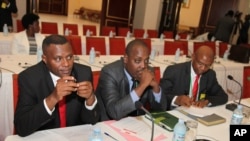Talks to end Burundi’s political crisis are slated to resume Thursday, but there is renewed and widespread doubt the talks will help bring peace to the unsettled central African country.
Opposition and civil society groups say the facilitator of the talks, former Tanzanian president Benjamin Mkapa, is dooming the process by welcoming politicians who tried to overthrow President Pierre Nkurunziza in a 2015 coup attempt.
It was not clear Wednesday whether the Burundian government will even send a representative to the talks in Arusha, Tanzania.
The opposition coalition CNARED initially said it will demand that Mkapa remove himself as facilitator but changed its position, saying Wednesday it will attend the talks without conditions.
Burundian political analyst Deogratias Nkinahamira is not expecting a breakthrough from the scheduled three days of talks.
“I don’t think the list of participants is reassuring,” he told VOA’s Central African service Tuesday.
“You have politicians who have been caught red handed, plotting to topple the government and you have feuds and factions within some of the political parties and within the opposition alliance CNARED. It is going to be hard for these politicians to agree on anything, let alone the agenda.”
His comments were echoed by Njangwa Becho Gilbert, the head of a Burundian election observer organization.
“The mediator’s office has made a mistake in inviting former ruling party leaders who have betrayed their party by joining those who were planning to topple the government, as well as the real coup plotters,” he told a Bujumbura news conference. Njangwa said he was speaking on behalf of 11 other civil society groups. He predicted the consultations are going to be rocky and fruitless at best.
Attempts to resolve the crisis have been held up by the government’s refusal to talk with coup supporters and the insistence by some opposition figures that Nkurunziza is not a legitimate president.
CNARED called on Mkapa to resign as facilitator in December, after he told journalists that politicians who consider Nkurunziza illegitimate are “out of their minds.”
Ahead of the talks this week, Burundi’s top prosecutor asked Tanzania to arrest and hand over all politicians invited to the talks who have a pending arrest warrant against them. The prosecutor issued a new list of 32 politicians and leaders of civil society groups who are wanted by Burundian authorities.
Former Burundian President Sylvestre Ntibantunganya said this week that time is of the essence, and politicians need to stop arguing over who will be allowed to participate and who will not.
“It is a sign of democracy that party and civil society groups leaders can voice out their opinion over participants to the consultations; however we have to keep in mind that the mediator is the regional trusted leader who is working tirelessly to help Burundians get out of the political imbroglio they have been in for over a year and half now,” he said.
Hundreds of people died in protests and violence sparked by Nkurunziza’s decision to run for a third term in 2015. Critics said the president was violating term limits in Burundi’s constitution.
The violence prompted hundreds of thousands to flee the country. As of today, the United Nations estimates the number of refugees has grown to 380,000.
Last week, the U.N. refugee agency reported that the number of Burundians fleeing political violence is expected to reach 500,000 this year, and said the U.N. is seeking more land for refugee camps in neighboring countries.




